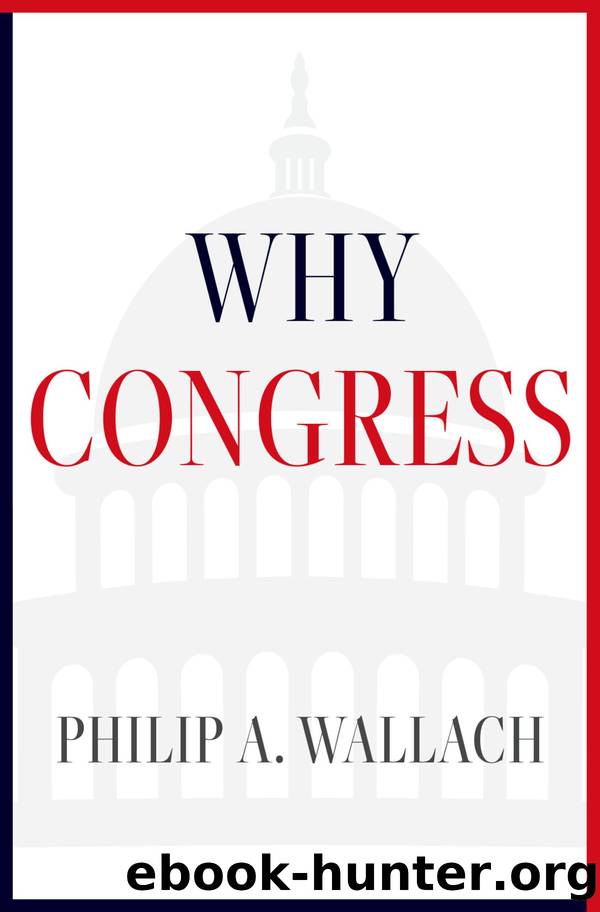Why Congress by Philip A. Wallach;

Author:Philip A. Wallach;
Language: eng
Format: epub, pdf
Publisher: Oxford University Press USA
Published: 2023-06-15T00:00:00+00:00
Policymaking under Gridlock
As we have seen, each party has accused the other of making policy in courts because they could not command majorities in Congress. These complaints capture a real dynamic, one subtler than denunciations of âjudicial activismâ suggest. Typically, Congress is aware of some important problemâoften caused by previous congressional actionsâand legislators then introduce and debate legislation to address the problem, but they lack the wherewithal to shepherd their bills through to passage. When Congress fails to act, the executive branch steps into the vacuum, and the judiciary is forced to either acquiesce to or reject policies, even if no legislative replacements are in the offing.
Now, legislating is supposed to be hard in our constitutional system. And those who hold our contemporary legislature in low regard may say that the less legislating Congress does, the better for the rest of us. But in the contemporary era, in which dozens of statutes have created a reservoir of vaguely defined powers at the executiveâs disposal, stalled legislation does not freeze the policymaking process. Instead, the president and executive branch agencies take initiative to fill the void, creatively interpreting existing statutory authorities to justify their actions. President Obama famously declared, âIâve got a pen, and Iâve got a phone,â giving him the power to set ambitious policymaking efforts in motion without any cooperation from Congress.42 The presidentâs opponents invariably denounce such actions but rarely can pass legislation to decisively clarify or limit executive branch powers. Instead, the most important form of opposition comes from litigation challenging the legality of the executive branchâs action. Statutory interpretation and administrative law, two subjects that sound deadly dull to most people, form the front lines of contemporary policymaking battles. If courts stymie the executive branch, that is not necessarily the end of the story; subnational policymakers (including state attorneys general43) may step forward to fill the gap, or trial lawyers acting through the tort system may come to shape their own policy regime.
American climate change policy presents a clear illustration of the shortcomings of trying to fashion policy without congressional action.44 Congress took some modest first steps on climate issues, asking the Environmental Protection Agency (EPA) to formulate a plan in 1987 and unanimously ratifying a nonbinding United Nations agreement in 1992. But it declined to create a regulatory scheme for carbon emissions in its Clean Air Act amendments of 1990 and overwhelmingly rejected efforts to join a binding treaty in 1997. During the George W. Bush administration, the EPA rejected environmental groupsâ petitions for rulemaking under the Clean Air Act, explaining that the statute was a poor fit for addressing climate changeâbut the Supreme Court rejected the agencyâs reasoning in Massachusetts v. EPA (2007).
It thus fell to Barack Obamaâs administration to devise an administrative response to climate change. Since a new statute would be better suited to deal with carbon emissions, many hoped that initiating executive action would force disparate factions to compromise on new legislation. House Democrats passed an ambitious cap-and-trade bill in 2009,
Download
This site does not store any files on its server. We only index and link to content provided by other sites. Please contact the content providers to delete copyright contents if any and email us, we'll remove relevant links or contents immediately.
Chaco's Northern Prodigies : Salmon, Aztec, and the Ascendancy of the Middle San Juan Region after AD 1100 by Paul F. Reed(338)
Law Enforcement Interpersonal Communication and Conflict Management by Brian Douglas Fitch(336)
Digital International Relations by Unknown(329)
Skilled interpersonal communication: Research, theory and practice, Fifth edition by Owen Hargie(317)
Critical Perspectives on Human Security : Rethinking Emancipation and Power in International Relations by David Chandler; Nik Hynek(316)
The Enduring Color Line in U.S. Athletics by Krystal Beamon Chris M. Messer(311)
Evidence-Based Policy Making in Labor Economics by Hamermesh Daniel S.;Nottmeyer Olga K.;Nottmeyer Olga;King Sarah;King Sarah;King Sarah;(280)
EPSO CAST Political affairs EU policies: How to succeed in the selection procedure by Franco Reverte José María(274)
Writing Public Policy - A Practical Guide to Communicating in the Policy Making Process by Catherine F. Smith(256)
Criminological Theory in Context by John Martyn Chamberlain(252)
Threshold Concepts in Women's and Gender Studies by Christie Launius Holly Hassel(250)
Tibeton Yoga Its Secret Doc by Evans-Wentz(249)
Positive Psychology and Spirituality in Counselling and Psychotherapy (Conflict, Ethics, and Spirituality, 12) by unknow(249)
Social Problems, Social Issues, Social Science by James Wright(246)
Rothschild and Early Jewish Colonization in Palestine (Geographical Perspectives on the Human Past) by Ran Aaronsohn(245)
Play in child development and psychotherapy: toward empirically supported practice by Sandra W. Russ(239)
Cognitive Development in Infancy and Childhood (Elements in Child Development) by Mary Gauvain(235)
Latin American Politics and Society by Gerardo L. Munck & Juan Pablo Luna(211)
What Makes a Social Crisis?: The Societalization of Social Problems by Jeffrey C. Alexander(209)
